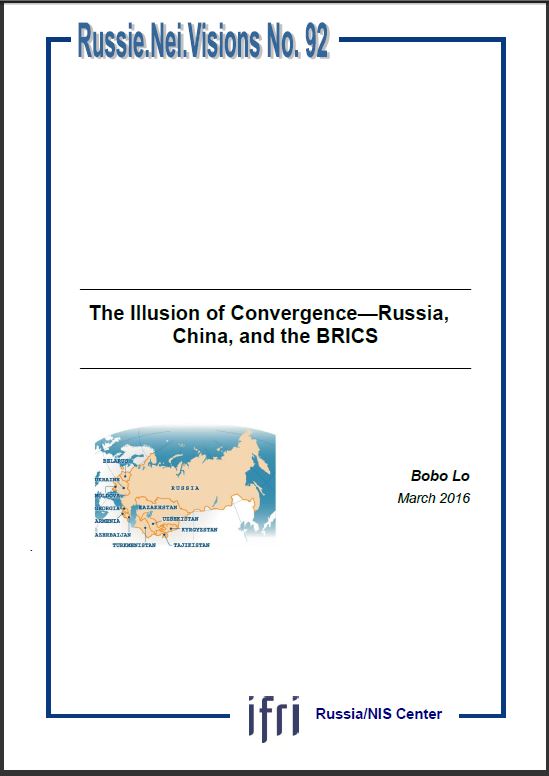The Illusion of Convergence—Russia, China, and the BRICS

The discussion about the BRICS (Brazil, Russia, India, China, and South Africa) opposes two narratives. The first considers they play an increasing role in the international relations as the West is loosing power; the other sees the BRICS as a charade. But the key role played by the interaction between Russia and China is an evidence shared by most experts.
Two narratives have dominated discussion of the BRICS (Brazil, Russia, India, China, and South Africa). The first asserts that this group of countries has become a major force in 21st century international politics, highlighting the shift of global power from the West. The second, by contrast, sees the BRICS as a charade, marked by the gulf between extravagant rhetoric and minimal achievement. The debate could scarcely be more polarized. Yet on one point there is convergence: the key to the viability of the BRICS framework lies in effective interaction between its two principal players, Russia and China.
Moscow and Beijing have assiduously promoted an image of likemindedness within the BRICS. But such efforts can hardly mask significant differences in attitudes and approach. President Putin identifies the BRICS as the foundation of a non-Western multipolar order in which Russia plays a central role. For the Chinese, however, it is a sideshow – only one among many instruments for advancing their interests in Eurasia and beyond. These contrasting perspectives severely limit the potential of the BRICS to offer an alternative model of global governance or act as an effective engine of international development. While the BRICS will remain part of the international landscape over the next few years, its relevance will come under increasing question.
Bobo Lo is an independent analyst. He was previously Director of the China and Russia Programmes at the Centre for European Reform; Head of the Russia and Eurasia Programme at Chatham House; and Deputy Head of Mission at the Australian Embassy in Moscow. He is an Associate Fellow of Chatham House’s Russia and Eurasia Programme, and an Associate Research Fellow with the Russie/NEI programme of the French Institute of International Relations (IFRI). Bobo Lo has an MA from Oxford and a PhD from the University of Melbourne.
Download the full analysis
This page contains only a summary of our work. If you would like to have access to all the information from our research on the subject, you can download the full version in PDF format.
The Illusion of Convergence—Russia, China, and the BRICS
Related centers and programs
Discover our other research centers and programsFind out more
Discover all our analysesDeathonomics: The Social, Political, and Economic Costs of War in Russia
The report attempts to outline and examine a truly new phenomenon in Russian society, dubbed “deathonomics”—the making of a mercenary army against the backdrop of the Kremlin’s war in Ukraine, eventually replacing both the Soviet (conscript) and early new Russian (contract) armies. It notes that, by the end of 2023, this trend had turned the military service into one of the highest-paying professions in the country, something not seen in Russia on such a scale since the late 17th century.
Russia's Asia Strategy: Bolstering the Eagle's Eastern Wing
Among Russia’s strategic priorities, Asia traditionally played a secondary role compared to the West. In the mid-1990s, then Foreign Minister Yevgeny Primakov initiated a rapprochement with China and India. Then, in 2014, deteriorating relations between Russia and the West prompted Moscow to begin its “great pivot to the East”.
Kazakhstan After the Double Shock of 2022: Political, Economic and Military Consequences
The year 2022 represented a dual shock for Kazakhstan. In January, the country faced its most severe political crisis since independence, followed in February by Russia’s full-scale invasion of Ukraine, which cast uncertainty over the borders of post-Soviet states. These consecutive crises profoundly shaped Kazakhstan’s domestic and foreign policy.

How the Russian Army Changed its Concept of War, 1993-2022
The traditional and high-intensity war that has occurred in Ukraine since Russia decided to invade raises a key issue: did post-soviet Russian strategic thought really prepare Russia for waging this war?











